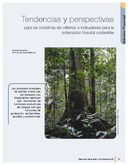| dc.contributor.author | Castañeda, F. | |
| dc.date.accessioned | 2015-03-19T22:11:20Z | |
| dc.date.available | 2015-03-19T22:11:20Z | |
| dc.date.issued | 2004-08 | |
| dc.identifier.issn | e-ISSN: 1659-1216 | es_EN |
| dc.identifier.uri | https://repositorio.catie.ac.cr/handle/11554/6846 | |
| dc.description | 9 pág. 1 ilus. 3 tab. 12 ref. | es_ES |
| dc.description.abstract | Diez años después de UNCED se han establecido
en todo el mundo nueve procesos sobre criterios e
indicadores que abarcan 149 países y cubren todo tipo de bosques. En su mayoría, estos procesos comenzaron implementando los criterios e indicadores a nivel nacional, pero en la actualidad
casi todos lo están haciendo a nivel de unidad de
manejo. Sin embargo, varios países, tanto entre los
más como los menos desarrollados, están experimentando problemas de implementación debido a
algunas deficiencias relacionadas con la: (a) capacidad técnico-administrativa instalada que se necesita para medir, evaluar y analizar la información
de campo así como para difundir los resultados de
las evaluaciones, (b) definición de terminología que
conlleve a un entendimiento común y (c) cantidad
poco manejable de indicadores inicialmente seleccionados. Esto ha inducido a muchos de los procesos a re-evaluar y hasta a re-definir algunos de
sus indicadores.
Desde UNCED, la FAO ha venido apoyando a los
países miembros de los distintos procesos actualmente en operación sobre criterios e indicadores
para la ordenación forestal sostenible, para que
continúen desarrollando e implementando estas
herramientas de manejo del bosque. Esta función
la lleva a cabo con el apoyo decisivo de otros organismos y/o instituciones internacionales como la
OIMT, PNUMA, CIFOR, IUFRO, CATIE, los gobiernos mismos, países donantes y otros. | es_ES |
| dc.description.abstract | Ten years after UNCED, nine processes related to
criteria and indicators (C&I) for sustainable forest
management have been established in 149 countries and covering all forest types. Whilst the resulting (C&I) processes have generally been developed
with the aim of being implemented on a national
level, most are now being implemented on the forest management unit level. However, both developing and developed countries are currently experiencing problems in the implementation of the C&I
due to deficiencies related to: (a) the technical and
administrative capacity needed to measure, evaluate, analyze and disseminate the information from
the field, (b) the definition of terminology leading to
a common understanding, and (c) the unmanageable number of indicators initially selected. This has
resulted in the re-evaluation of many of the
processes and the re-definition of the indicators.
Since UNCED, FAO has been supporting countries
participating in the various on-going international
processes on C&I to further develop and implement these forest management tools. FAO provides such support in collaboration with other international organisations and such as ITTO, UNEP,
CIFOR, IUFRO, CATIE, governments, donor countries and others | |
| dc.language.iso | es | es_ES |
| dc.publisher | CATIE, Turrialba (Costa Rica) | es_ES |
| dc.relation.ispartof | Recursos Naturales y Ambiente Número 42 (Agosto 2004), páginas 51-59 | |
| dc.rights | info:eu-repo/semantics/openAccess | |
| dc.subject | ORDENACION FORESTAL | |
| dc.subject | ORDENACION FORESTAL | |
| dc.subject | SOSTENIBILIDAD | |
| dc.subject | INDICADORES | |
| dc.subject | MANEJO FORESTAL | |
| dc.subject | UTILIZACION SOSTENIBLE | |
| dc.subject | ORDENACION FORESTAL SOSTENIBLE | |
| dc.subject | BOSQUES | es_ES |
| dc.title | Tendencias y perspectivas para las iniciativas de criterios e indicadores para la ordenación forestal sostenible | es_ES |
| dc.title.alternative | Criteria and indicators for sustainable forest management: tendencies and perspectives | es_ES |
| dc.type | Artículo | es_ES |
| dc.journal.issueNumber | 42 | |


